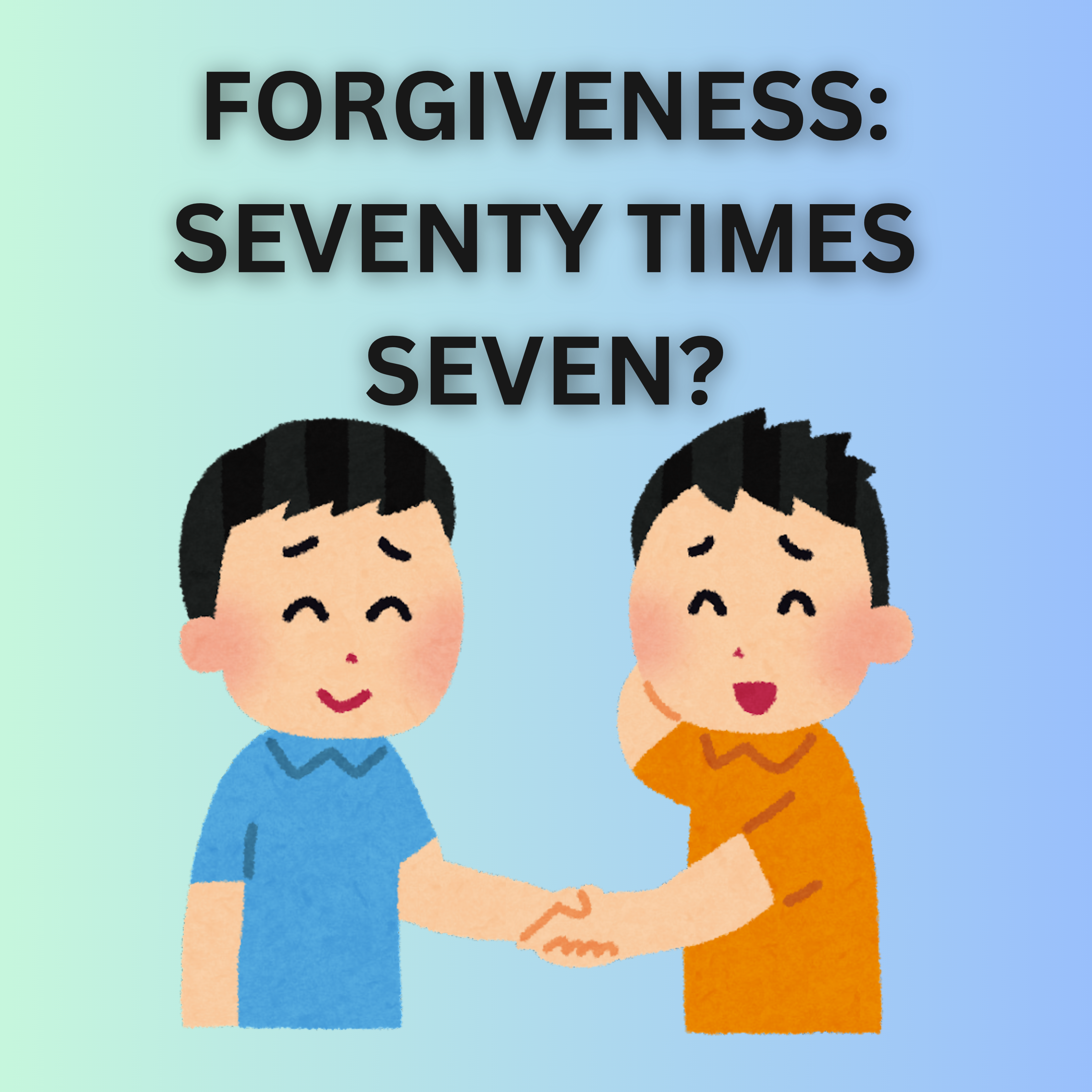Introduction To Forgiveness: Seventy Times Seven?
Forgiveness is a complex and often misunderstood concept that plays a vital role in human relationships and personal well-being. Rooted in various philosophical, psychological, and religious traditions, the idea of forgiveness challenges us to move beyond resentment and anger. The phrase “seventy times seven,” derived from a passage in the Bible (Matthew 18:22), illustrates the notion that forgiveness should be boundless. This article will explore the nature of forgiveness, its psychological and spiritual dimensions, the barriers that impede our ability to forgive, and practical steps toward cultivating a forgiving heart.
Understanding Forgiveness
At its core, forgiveness involves a conscious decision to let go of feelings of resentment or vengeance toward someone who has harmed you. It doesn’t mean condoning the wrongdoing or excusing the behavior; rather, it’s about freeing oneself from the emotional burden of anger and hurt. Forgiveness can manifest in various forms, from simple acts of letting go to more profound processes that involve deep emotional and psychological work.
The Psychology of Forgiveness
Psychologically, forgiveness is recognized as a vital component of emotional health. Researchers have identified numerous benefits associated with forgiving others, including:
- Reduced Anxiety and Depression: Holding onto grudges can lead to chronic stress and anxiety. Forgiveness often alleviates these symptoms, contributing to better mental health.
- Improved Relationships: When we forgive, we open the door to healing and reconnection, fostering healthier and more meaningful relationships.
- Enhanced Well-being: Studies suggest that people who practice forgiveness report higher levels of happiness and life satisfaction.
The process of forgiveness can be viewed through different psychological lenses, including cognitive-behavioral therapy (CBT) and positive psychology, both of which emphasize changing thought patterns and cultivating positive emotions.
Spiritual Dimensions of Forgiveness
Many spiritual and religious traditions emphasize the importance of forgiveness. In Christianity, for example, the concept of “seventy times seven” signifies an endless capacity for forgiveness, reflecting God’s grace toward humanity. Similarly, in Buddhism, forgiveness is tied to compassion and understanding, promoting a sense of interconnectedness and reducing suffering.
Forgiveness in Religious Texts
- Christianity: The New Testament encourages believers to forgive repeatedly, highlighting the transformative power of grace and mercy.
- Islam: Forgiveness is seen as a noble trait, with the Quran urging followers to pardon those who have wronged them.
- Hinduism: The concept of forgiveness is intertwined with karma, suggesting that forgiving others can lead to spiritual growth and liberation.
These traditions collectively emphasize that forgiveness is not just an individual act but a communal and relational process that benefits everyone involved.
The Barriers to Forgiveness
While the benefits of forgiveness are clear, many individuals struggle to forgive due to various barriers:
Emotional Barriers
- Anger and Resentment: Lingering anger can be a significant obstacle. It often feels easier to hold onto the pain rather than confront the emotional turmoil that forgiveness requires.
- Fear of Vulnerability: Forgiveness can feel like relinquishing power, leading to fears of being hurt again. This fear can create a protective barrier against opening oneself up to forgiveness.
Cognitive Barriers
- Rationalizations: Individuals often rationalize their grudges, believing that holding onto anger is justified. This cognitive distortion reinforces the decision to remain unforgiving.
- Victim Mentality: Embracing a victim identity can prevent individuals from taking the necessary steps toward forgiveness, as it often provides a sense of control and validation.
Social Barriers
- Cultural Norms: In some cultures, expressing anger and holding grudges may be more socially acceptable than forgiving, complicating the process.
- Lack of Support: Without a supportive environment that encourages forgiveness, individuals may feel isolated in their struggles.
The Process of Forgiveness

Forgiveness is not a one-time event but a process that can take time and effort. Here are practical steps to help guide this journey:
1. Acknowledge Your Feelings
Recognizing and validating your emotions is the first step. Allow yourself to feel the pain, anger, and hurt before moving toward forgiveness.
2. Understand the Impact
Reflect on how holding onto resentment affects your life. Consider the emotional toll it takes and how it hinders your well-being.
3. Empathize with the Offender
Try to see the situation from the other person’s perspective. Understanding their motivations and struggles can foster compassion and facilitate forgiveness.
4. Make a Conscious Choice to Forgive
Forgiveness is an intentional decision. Affirm your commitment to let go of grudges, even if it feels difficult.
5. Communicate Your Forgiveness
If appropriate, express your forgiveness to the person who wronged you. This can help reinforce your decision and provide closure.
6. Let Go of Expectations
Release any expectations regarding how the other person should respond. Forgiveness is about your healing, not theirs.
7. Focus on the Present
Shift your attention from past grievances to the present moment. Engage in activities that bring joy and fulfillment.
The Transformative Power of Forgiveness
The journey toward forgiveness can be transformative. It allows individuals to reclaim their lives, free from the shackles of resentment. Embracing forgiveness fosters emotional resilience and a deeper understanding of oneself and others.
Case Studies and Testimonials
Many individuals have shared their stories of forgiveness, illustrating its profound impact on their lives. For instance, a survivor of a traumatic event might recount how forgiving their perpetrator brought peace, allowing them to move forward rather than remain stuck in a cycle of pain.
The Role of Forgiveness in Conflict Resolution
In both personal and societal conflicts, forgiveness plays a crucial role. It can be a powerful tool for reconciliation, enabling individuals and communities to heal from past wounds and build stronger relationships moving forward.
Conclusion: Seventy Times Seven
Forgiveness is not merely an act but a transformative journey that can lead to profound emotional and spiritual growth. The call to forgive “seventy times seven” reminds us of the boundless nature of this practice, urging us to cultivate a heart that is open and compassionate.
In a world often marked by conflict and division, the ability to forgive can foster healing and unity. As we navigate our personal journeys, let us strive to embrace forgiveness—not only for the sake of others but for our own well-being. By letting go of resentment, we can cultivate a life filled with peace, joy, and deeper connections to ourselves and those around us.
